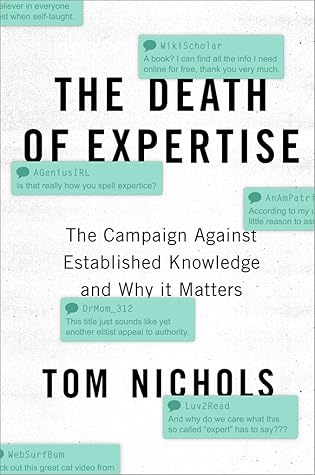More on this book
Community
Kindle Notes & Highlights
Started reading
January 1, 2025
The United States is now a country obsessed with the worship of its own ignorance.
No, the bigger problem is that we’re proud of not knowing things. Americans have reached a point where ignorance, especially of anything related to public policy, is an actual virtue. To reject the advice of experts is to assert autonomy, a way for Americans to insulate their increasingly fragile egos from ever being told they’re wrong about anything. It
it is narcissism, coupled to a disdain for expertise as some sort of exercise in self-actualization.
There is a cult of ignorance in the United States, and there always has been. The strain of anti-intellectualism has been a constant thread winding its way through our political and cultural life, nurtured by the false notion that democracy means that “my ignorance is just as good as your knowledge.” Isaac Asimov
it is unfounded arrogance, the outrage of an increasingly narcissistic culture that cannot endure even the slightest hint of inequality of any kind.
if citizens do not bother to gain basic literacy in the issues that affect their lives, they abdicate control over those issues whether they like it or not. And when voters lose control of these important decisions, they risk the hijacking of their democracy by ignorant demagogues, or the more quiet and gradual decay of their democratic institutions into authoritarian technocracy.
All societies, no matter how advanced, have an undercurrent of resentment against educated elites, as well as persistent cultural attachments to folk wisdom, urban legends, and other irrational but normal human reactions to the complexity and confusion of modern life.
“The low level of political knowledge in the American electorate,” Somin correctly notes, “is still one of the best-established findings in social science.”3
In reality, that guess is not only wrong, but wildly wrong: foreign aid is a small fraction of the budget, less than three-quarters of 1 percent of the total expenditures of the United States of America.
an expert “is someone who knows some of the worst mistakes that can be made in his subject and how to avoid them.”
Years of better education, increased access to data, the explosion of social media, and lowered barriers to entry into the public arena were supposed to improve our abilities to deliberate and decide. Instead, these advances seem to have made all of this worse rather than better.
I try to explain about risk. Because I have recently noticed how few people really understand the risks they face. I watch people keep guns in their houses, drive without seatbelts,
eat artery-clogging French food, and smoke cigarettes, yet they never worry about these things. Instead they worry about AIDS. It’s kind of crazy.
We are gripped by irrational fear rather than irrational optimism because confirmation bias is, in a way, a kind of survival mechanism. Good things come and go, but dying is forever.
These kinds of overcomplicated explanations violate the famous concept of “Occam’s Razor” (sometimes spelled “Ockham”), named for the medieval monk who advocated the straightforward idea that we should always begin from the simplest explanation for anything we see. We should only work our way up toward more complicated explanations if we need them. This is also called the “law of parsimony,” meaning that the most likely explanation is the one that requires the fewest number of logical leaps or shaky assumptions.
Such theories also appeal to a strong streak of narcissism: there are people who would choose to believe in complicated nonsense rather than accept that their own circumstances are incomprehensible, the result of issues beyond their intellectual capacity to understand, or even their own fault.
The reality is that social insecurity trips up both the smart and the dumb. We all want to be liked.
performing a pastiche of knowledgeability that is really a new model of know-nothingness.14
Unearned praise and hollow successes build a fragile arrogance in students that can lead them to lash out at the first teacher or employer who dispels that illusion, a habit that proves hard to break in adulthood.
One of the things students are supposed to learn in college is self-reliance,
because they have absorbed the idea that the students really are their peers, a mistake that hurts both teaching and learning.
But to be a student requires a certain modicum of humility. Thus, the student owes the teacher trust, docility, effort, thinking.12
But education, even when done skillfully, can produce illusory confidence.”13


